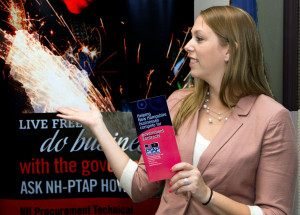Posts Tagged ‘5 Questions’
Friday, January 22nd, 2016
Now in its 25th year, the New Hampshire Innovation Research Center is the bridge connecting collaborations between industry and the University of New Hampshire. Since it was created by an act of the Legislature in 1991, the NHIRC has awarded more than $6 million in state funds to support research projects and has been responsible for the creation or retention of 650 jobs. Marc Sedam, Associate Vice Provost for Innovation and New Ventures, talks about center.
 Marc Sedam ~ NHIRC 1. Part of the mission of the New Hampshire Innovation Research Center is to attract new business to New Hampshire. What does that look like on a day-to-day basis?
The NHIRC is funded directly by the state to promote university-industry collaborations based on industry need. We have 1-2 funding cycles each year.
2. Can you share some of the latest product and process innovations to come out of an NHIRC collaboration?
The IRC recently funded research on the interoperability of medical devices and the ‘big data’ of medicine, as well as research aimed at improving the electrical conductivity of carbon nanotube wire, to the point where it can replace copper for power applications.
3. Companies can get assistance with their proposals to NHIRC from university researchers. How does the process work?
Companies applying to the NHIRC need to have a partner that is a New Hampshire college or university. So the assistance piece is usually a research strength that the University has or can help with, that extends the capacity of the company’s efforts. Companies either come to the program with a university/college partner already identified, or can come to us needing a partner and we can do matchmaking.
4. From a personal perspective, what drives you in your work? What things about NHIRC make you excited every day?
I always get excited about universities and industry working together. When the RFPs come out, I enjoy seeing what New Hampshire businesses are up to and where their research might take them in the future. University-industry collaborations drive economic strategy in most areas of the US and it would be great to see more of that in New Hampshire.
5. What does NHIRC have on the horizon that’s particularly exciting or, well, innovative?
We’ve begun providing Small Business Innovation Research and Small Business Technology Transfer education and training that has been well received. New Hampshire has under performed relative to the states around us in acquiring SBIR/STTR funding in the past, so we’re glad to see there’s real interest in this work.
Tags: 5 Questions, Marc Sedam, NH Innovation Research Center
Posted in NH Business Matters | Comments Off on 5 Questions with Marc Sedam, New Hampshire Innovation Research Center
Friday, January 15th, 2016
We’re taking our 5 Questions to the North Country this morning and chatting with Pamela Laflamme, community development director for the City of Berlin. She is an ideal fit for that position – this is where she grew up and where she returned. Over the past 15 years, with the demise of its paper industry, Berlin has been evolving, creating new opportunities for small businesses attracted to the beauty of the area and the quality of life.
 Pamela Laflamme ~ Community Development Director, Berlin 1. Can you explain a bit about what BIDPA does for Berlin and surrounding communities, and your role within BIDPA?
The Berlin Industrial Development and Park Authority, by state statute, was created under RSA 162-G along with the City of Keene. BIDPA works with local businesses to grow and retain jobs. It also works with developers looking to locate or relocate to the community.
BIDPA is group of volunteers that serve the city as an enterprise fund of the municipality. I provide staff assistance to the board, along with our city manager, Jim Wheeler. BIDPA works on projects alone as well as with other partners throughout the region and the state.
2. You’ve been the community development director in Berlin for 15 years. What is it about the area that makes it particularly attractive for businesses?
The city works hard with businesses to help them succeed. Berlin has a long history with manufacturing and while that sector has seen a lot of decline over the last decade, smaller businesses have come to the community to take advantage of that workforce. We live in a beautiful part of the state, surrounded by numerous recreational opportunities. Being able to finish your work day and get out to do some fishing, skiing, hiking or ATVing within a few miles of your workplace is very appealing to those who enjoy the outdoors. Hard workers, a dedicated group of city councilors, BIDPA members and the accessibility of the outdoors are just a few reasons to live, work and play in our area.
3. Berlin was named the 2015 City on the Rise by New Hampshire Magazine. Can you share highlights of business projects contributing to Berlin’s improvement?
The City on the Rise recognition was a welcome surprise to the community. The Androscoggin Valley Chamber of Commerce and the Main Street program are extremely active, with hard working volunteers who create several highly successful events every year, including the very popular RiverFire, Jericho ATV Festival and Brewtopia.
The Women’s Rural Entrepreneurial Network opened a second location this summer in downtown, bringing a lot of activity to Berlin. We have been working with developers to reuse old school buildings, and they are providing quality housing options to seniors and residents of low and moderate income, cleaning up our neighborhoods. The city has been working diligently over the last decade to rebuild the local economy and provide more job diversity. The City on the Rise award tells us that other people are noticing our hard work.
4. Putting yourself in the shoes of a business considering moving or expanding to Berlin from out of state, what are the most important things it should plan for to make the transition easy and how does BIDPA help?
BIDPA works hard with developers to make their transition as painless as possible. We recently helped a company from Massachusetts establish a second location in our industrial park. Our chairman, Mike Caron, a local businessman himself, worked closely with the company’s owner to help him connect with the programs and organizations that could assist in setting up the new location. We connected them with the local office of Employment Security to help screen applicants, brought them to the regional economic development organizations to assist with funding, and we are happy to report our support has paid off with a successful Community Development Block Grant project with Coos Economic Development Corp. and several new jobs that will put displaced manufacturing employees back to work.
Chairman Caron is dogged in his work to make sure those who want to locate here are able to do so with as little hassle as possible.
5. What’s coming up for BIDPA?
BIDPA has several projects in the works that are in the early development stages, so it is too soon to discuss them publicly. The board is optimistic and they are looking forward to a productive 2016; check back with us next year!
Tags: 5 Questions, Berlin Industrial Development and Park Authority, City of Berlin, Pamela Laflamme
Posted in NH Business Matters | Comments Off on 5 Questions with Pamela Laflamme, Community Development Director, City of Berlin
Friday, January 8th, 2016
We talk about international trade a lot on this blog, letting our businesses throughout the state know about the opportunities to be had overseas. Global markets likely need products and services made right here in New Hampshire – they just need to know where to find them. Our Office of International Trade works diligently to introduce businesses to these markets through its many partnerships. James Demers answers this week’s 5 Questions about one of those organizations.
 James Demers 1. Can you explain a bit about what the International Trade Advisory Committee does for the state and your role within it?
The International Trade Advisory Committee is a committee authorized by law with the primary mission of assisting the Department of Resources and Economic Development and the state’s Office of International Commerce in promoting and increasing international trade for New Hampshire businesses.
Legislative leaders have recognized that opportunities exist for New Hampshire businesses to participate in the world economy and they have actually tasked DRED with developing resources to assist companies in this area. So, ITAC is one element that brings a group together with experience and interest in international trade to assist with these goals.
2. You’ve been involved in the field of international trade for many years, even serving on the board of directors of the Overseas Private Investment Corp. What can you tell us about the opportunities for New Hampshire in the export market?
It is an honor to serve as chairman of New Hampshire’s International Trade Advisory Committee as well as having been appointed by President Obama to serve on the board of the Overseas Private Investment Corp., which is the federal government’s development financial institution.
Many people think that international trade and business opportunities in developing countries are solely for very large corporations, but one of the things I have learned from both organizations is there are tremendous international opportunities for small businesses too.
The key point is businesses need to think a bit outside of the box. If they have a product or service that works well here in New Hampshire or in the United States, it is likely there are other places that could use it too. As a matter of fact, in many cases there are foreign markets that lag the United States and need many products we take for granted here.
Companies, big and small, that are looking to grow should think about potential opportunities in other countries. And that is where the state’s Office of International Commerce can help. Small businesses rarely have the expertise to figure out how to proceed in getting into another country, or even determining where opportunities might exist. People need to recognize the state has a division that can assist them.
3. Are there industries in New Hampshire that may not be thought of as exporters, but could discover tremendous opportunity for their businesses if they pursued an export strategy?
Absolutely. The one that comes to mind is in the healthcare delivery system. During Governor Hassan’s trade mission to Turkey, I met with a businessman in Istanbul who owns a cancer treatment hospital in Turkey. He told me that they have several missing elements of cancer healthcare, most notably hospice and palliative care facilities. That made me realize there is a significant need for hospice services that could be delivered by American entities that know how to deliver this aspect of service.
4. What are the biggest challenges to New Hampshire exporters right now, and what is ITAC doing to help solve them?
One of the challenges is actually finding foreign business markets and making contacts in countries that might help develop export opportunities. That is where the state’s Office of International Commerce can help. Businesses should not hesitate reaching out to the OIC for assistance.
5. What’s coming up for ITAC that’s new and exciting?
Earlier this year, the legislature amended the ITAC law, adding additional members who will bring more expertise in the area of international trade. We have always had support from federal agencies like the Commerce Department and Small Business Administration, but the law change also adds representatives from the state’s four-member congressional delegation, which hopefully will help coordinate even stronger collaboration between state and federal trade agencies. This should help bring even more resources and information for New Hampshire businesses looking to enter foreign markets.
Tags: 5 Questions, exporting, James Demers, Office of International Commerce
Posted in NH Business Matters | Comments Off on 5 Questions with James Demers, New Hampshire International Trade Advisory Committee
Friday, September 18th, 2015
Regional development corporations are located in each of New Hampshire’s 10 counties and are a valuable resource to businesses. RDCs are another layer of business assistance whose goal is to help companies thrive and prosper. can provide financing for machinery and equipment; business or real estate acquisitions; working capital; gap financing and other business assistance. Today’s 5 Questions’ guest is an old friend of the Division of Economic Development, where he worked for two years before heading up to Grafton County.
 Chris Wellington ~ Grafton County EDC 1. Can you explain a bit about what the GCEDC does for the region, and your role within it?
The Grafton County Economic Development Council is a 501(c)3 economic development organization and is one of 10 regional development corporations (RDCs) in the state. We provide financial solutions and technical assistance to businesses and assist the 39 municipalities in Grafton County with their economic development initiatives and projects.
Over the last five years, GCEDC has provided more than $2.9 million in financing to businesses throughout Grafton County, helping to retain more than 200 full-time jobs and creating 153 additional full-time jobs. All of our work is geared toward job retention and creation, and one of the best ways to create jobs is by supporting entrepreneurs and small businesses.
Most of our initiatives supporting entrepreneurs and the small business community are run through our two business incubators, the Dartmouth Regional Technology Center in Lebanon and the Enterprise Center at Plymouth. GCEDC’s motto is Economic Development through Partnerships and we are very fortunate to partner with Plymouth State University at the ECP and Dartmouth College at the DRTC. Each institution brings so many resources to the table that can be leveraged for the benefit of the business community.
As the CEO of GCEDC, I am responsible for the day-to-day operations and strategic direction of the organization. It’s a very rewarding job where no day is ever the same.
2. You’ve worked in economic development for a number of years, and across many regions of the state. What is it about Grafton County that makes it uniquely attractive for businesses?
Grafton County has all the features and amenities needed for a company in any industry to succeed. The pharmaceutical, high tech and healthcare industries are thriving in the Upper Valley. Northern Grafton County has a strong and growing manufacturing base and the tourism industry reigns supreme in the Pemi Valley. Grafton County’s business landscape is very diverse and no matter what business you’re in, there’s a place for you in the county.
Grafton County is also home to Dartmouth College, Plymouth State University, River Valley Community College and White Mountain Community College, which provide unparalleled access to a skilled and educated workforce. This is all in addition to the county’s scenic beauty and the ability to truly play where you work.
3. You’ve been nominated for Young Professional of the Year for Stay Work Play’s Rising Stars Awards. How are young professionals playing a role in the success of Grafton County’s economy?
Young professionals are making a huge difference throughout the state of New Hampshire and especially in Grafton County. In northern Grafton County, you have young professionals like Lauren Anderson, executive director of the Littleton Area Chamber of Commerce and Courtney Wrigley of NH Listens transforming Littleton into a destination for young professionals.
In the Upper Valley, you have young professionals like Jamie Coughlin, director of entrepreneurship at Dartmouth College; Erikk Anderson, serial entrepreneur and co-founder of Compass Therapeutics and Todd Boucher, founder of Leading Edge Design Group, building businesses, creating jobs and supporting the entrepreneurial ecosystem.
And in the Pemi Valley area, you have PSU graduates Chad Johansen, owner of NH iPhone Repair, and Spirit Seeker, owner of Affirm Community Accounting, taking the leap into entrepreurship and building their businesses at the ECP. At every corner of Grafton County there are young professionals supporting the community and economy. I am very excited for the opportunity to work with these individuals and the many others who support our young professional community.
4. Putting yourself in the shoes of a business considering moving or expanding to Grafton County from out of state, what are two or three things they should consider, or for which they should plan, to make the transition easy? And how does the GCEDC help with those things?
I always encourage businesses to connect with local leadership and the New Hampshire Division of Economic Development. Beno Lamontagne, Michael Bergeron and Cindy Harrington are excellent resources and can help a business in a number of ways, including helping them navigate through the permitting process at the state level. It is also critical to meet with local leaders to make sure you understand the process for operating a business in that particular community. I am fortunate to work in an area of the state where all the communities welcome businesses with open arms, which isn’t always the case in more urban communities.
GCEDC has played a role in helping a number of businesses move or expand into Grafton County and we can provide a wide range of services. Since we provide financing options, we can work with the business to help them access the capital they need to expand. The recruitment and retention of a business is a team effort and GCEDC can’t act alone and be successful when assisting a business looking to relocate or expand. Each business’ needs are different and we would find out what those needs are and with the assistance of our partners, develop a plan that’s unique to those needs so their chances of success are greatly increased.
5. What’s new or exciting on the horizon for GCEDC?
Change is the only constant. Like in business, if you are not moving forward, you are moving backwards and GCEDC is moving forward with force. My predecessor, Mark Scarano, left the organization in a very strong place and my goal is to build on that foundation and provide a greater array of services to municipalities and our small business community.
I am really excited to share that we will soon be undertaking a rebranding effort that includes a new logo and redesigned website. We will also be creating a monthly newsletter to stay more connected to our stakeholders. We can’t help a business if they don’t know about the services we provide. If we can increase our profile throughout Grafton County we will be able to help support more businesses, which is what it’s all about.
Connect with Chris Wellington:
cwellington@graftoncountyedc.org
603-536-2011 x10
or toll free at
1-888-535-0002
Tags: 5 Questions, Chris Wellington, Grafton County
Posted in NH Business Matters | Comments Off on 5 Questions: Chris Wellington, Grafton County Economic Development Council
Friday, August 14th, 2015
With so many ways to get the news of the minute, hour, day or week, the sheer volume can take up valuable time. In New Hampshire, we’re fortunate to have venerable publications that devote space and talent to covering the people, trends and opinions about the businesses and industries that keep our economy humming. Today’s guest is Jeff Feingold, editor of the bi-weekly NH Business Review, who does, in fact, mind our business and offers his tips for getting his publication’s attention about your news.
 Jeff Feingold ~ NH Business Review 1. What kinds of business news are you looking to publish these days?
We publish a wide range of news about New Hampshire businesses and nonprofits. In addition to our staff-written articles on issues and trends affecting business, we regularly publish features and interviews with businesspeople and others of interest to our readers. We also welcome announcements of new products/services, staff changes, relocations, awards and honors, charitable donations — you name it.
2. Can businesses still get a garden-variety press release published in NHBR anymore?
We do publish information from press releases, mostly in our regular feature, The Latest. We also have a calendar we update daily online and appears in print each issue.
3. What are two to three suggestions businesses can do better to increase the chances their news release will be used in NHBR?
– Make sure it’s applicable to our audience, news that our readers would be interested in.
– Include an interesting photo.
– Make sure the press release is short, to the point and written in plain English. Press releases filled with jargon and those that take two or three paragraphs to get to their point definitely have less of a chance of being read all the way through and making it to print or online.
4. What are some of the biggest mistakes you’ve seen business professionals make in trying to get you to publish their news for them?
Sending releases to a publication without even having read an issue and not knowing what the frequency of a publication is. If you’re contacting a publication about a time-specific event or story, it’s a good idea to do it well before the event’s date. You increase your changes of getting the event covered if you give advance notice.
5. How do businesses best go about submitting a release for your consideration?
The best way to email it to me at jfeingold@nhbr.com, or our assistant editor, Liisa Rajala, at lrajala@nhbr.com
Tags: 5 Questions, Jeff Feingold, NH business news, NH Business Review
Posted in NH Business Matters | Comments Off on 5 Questions: Jeff Feingold, New Hampshire Business Review
Thursday, August 6th, 2015
The next best idea that could change the world may just come out of New Hampshire or northern New England. But getting that idea off the ground and into our lives is the challenge, especially if it’s hard to find early stage capital. This is where folks like Phil Ferneau and Borealis Ventures comes in and that’s who we meet in today’s Five Questions.
 Phil Ferneau ~ Borealis Ventures 1. Borealis is particularly passionate about supporting New Hampshire businesses. What is it about the Granite State that drives you?
We founded Borealis on our first-hand knowledge of New Hampshire’s entrepreneurial potential and our confidence in its investment opportunities. Beyond that, this is where we live, raise our families, and contribute to our communities. While we have invested elsewhere, the Granite State is where our professional commitment to supporting exceptional entrepreneurs aligns with our personal convictions to make a difference by helping to build the state’s next generation of high-growth technology companies.
2. Where do you see the biggest opportunity for startups and entrepreneurial ventures in New Hampshire?
New Hampshire’s academic campuses and established technology companies have historically helped inspire and launch many of the state’s entrepreneurs. That remains true today with promising startups emerging from, for instance, the software and Internet infrastructure community around Manchester and Nashua, the Upper Valley’s bioengineering cluster, and innovative students and faculty at campuses across the state. More fundamentally, New Hampshire’s attractive business climate, quality of living, and wealth of social capital make the state a compelling place to build companies that can serve customers worldwide. In today’s connected global economy, innovation possesses the same inherent commercial opportunity when the eureka arises in New Hampshire as it does in larger metropolitan areas.
3. What are two or three of your latest New Hampshire-based ventures?
Our newest investment is Adored, which uses Apple’s iBeacon technology to help businesses and brands engage more effectively with their customers. Another recent investment is Builtr, a media intelligence company that we founded to serve the architecture, engineering, and construction professionals who create our built environment. We are also enthusiastic about the progress of our more developed NH investments, including Adimab (antibody discovery), Avitide (biopharmaceutical purification), DYN (Internet as a Service), and Newforma (project information management software).
4. Borealis plays a key role in business competitions like TechOut. How have these events helped the entrepreneurial community in New Hampshire?
Borealis has supported business competitions in New Hampshire from our earliest days – not just TechOut, but also Accelerate NH and Dartmouth Ventures in the past year alone. We believe such events provide invaluable opportunities not only to showcase emerging companies and help them refine their pitches and access the resources needed to build their businesses, but also more generally to rally the state’s entrepreneurial community and inspire new startups.
5. What’s next on the horizon for Borealis? How will you soon be making an even bigger impact in New Hampshire and beyond?
As New Hampshire’s leading early-stage investor over the past decade, we look forward to continuing to invest in the state’s most promising emerging technology startups. Beyond that, we are passionate about furthering the entrepreneurial infrastructure to attract, educate, connect, mentor, and otherwise nurture the state’s next generation of technology innovators and business builders. We are enthusiastic and active supporters of the organizations that are building real momentum in New Hampshire’s startup scene, including Alphaloft in Manchester and the Seacoast, the Dartmouth Entrepreneurial Network (DEN) in the Upper Valley, as well as the statewide Live Free and Start initiative.
Tags: 5 Questions, Borealis Ventures, New Hampshire entrepreneurs, Phil Ferneau, start-up ecology
Posted in NH Business Matters | Comments Off on 5 Questions with Phil Ferneau, Borealis Ventures
Friday, July 24th, 2015
There’s no way to sum up adequately, in such a short space, the impact a person like Mary Collins has had on the state of New Hampshire. At the end of May, Mary retired after more than two decades of service with the New Hampshire Small Business Development Center, working tirelessly to improve the fortunes of thousands of small businesses, as well as the overall economy of the Granite State.
On the occasion of her retirement, we asked Mary a few questions – five, to be precise – about her time with the SBDC, the business environment in New Hampshire, and whether she’ll still be involved in the inner business workings of the state she’ll continue to call home.
1. You were with the SBDC for 22 years and served as state director for 18 of them. As you look back, what are two or three things you’ll remember most fondly about your time there?
– Engagement, and the long lasting friendships that I made with colleagues, clients, stakeholders, students and staff throughout New Hampshire and the US. As SBDC state director, I covered the entire state, served on numerous boards in NH and also had the opportunity to serve on the national Association of Small Business Development Center’s board, as well as the national accreditation team. This job has provided me the opportunity to meet and engage with wonderful people throughout New Hampshire and in all states throughout the US. Each time I drove to the North Country and passed through the notch, or headed to Keene or Portsmouth, I would think how fortunate I was to have a job that allowed me to take in the beauty of New Hampshire while working!
– Legislative Activity. SBDC is a cooperative program with the US SBA, the Department of Resources and Economic Development, the University of New Hampshire and the private sector – maintaining our federal, state and local funding is a key component of this job – and I have to admit I am a political junkie and have loved this part of my job – I love going to Washington, DC and to the Hill. Yes, we have had our critical moments such as sequestration and natural and economic disasters affecting our small businesses, however during the past 18 years I’ve been fortunate to have worked closely with our entire federal delegation and its amazing staffers, as well as several New Hampshire governors and many state legislators. This can only happen in a small state like New Hampshire – my colleagues in the large states envy our access to top federal and state leadership.
– The ability to be creative! Each day I could wake up and think of some activity or process that might assist a small business client or our staff and we could actually make it happen. The job is truly entrepreneurial and only possible with a great supportive staff, which I have so appreciated.
2. A lot has changed in the world of small business over the last two decades. But what would you say has stayed the same (and still remains important) for small businesses today?
Building a sustainable business requires a team effort – there are numerous federal and state programs to assist small businesses, yet entrepreneurs are so busy with day-to-day survival that they are not always aware, or do not have the time to search out these programs. A savvy entrepreneur will utilize all resources available to them as they build a strong foundation for their business – the payoff is measurable. What has also stayed the same is the need to have access to capital!
3. Your efforts to support business in the state go far beyond the SBDC. How has your work with the New Hampshire High Tech Council and EPSCOR (to name just two) also helped the SBDC with its own mission?
My philosophy has always been that small businesses need a voice at the table. The reality is that they do not have the time to attend outside meetings, nor are they always aware of critical opportunities. During the 13 years that I served on the board of the NHHTC, I was able to match the needs of SBDC clients with opportunities I learned about through NHHTC member companies, or those with whom we collaborated, such as legislators, entrepreneurs, academia etc.
For example, a SBDC client who needed an engineering lab to further develop his product was approached by a Massachusetts university, but he wanted to stay in New Hampshire. We were able to match that client with a lab at UNH.
The same has been true with my participation on the EPSCOR board, which has representation from Dartmouth, UNH, the state, and the private sector – all directed at grant opportunities for entrepreneurs in New Hampshire. The SBDC provides assistance to all aspects of running a small business – we can be our clients’ voices at the state, federal, and local level through our engagement in specific boards and committees.
4. What’s next for you? Are you retiring completely, moving onto another venture, or just taking time to see what will happen next?
I had been thinking about retirement for the last couple years, but I always found something else that I wanted/needed to do in my career. My husband retired four years ago and had been bugging me to join him. What finally convinced me was having time available for our long-planned trips, as well as travel to see my children and grandchildren. My son and his family are in Florida; my daughter is in Las Angeles and my four siblings and their families are located throughout the US. We have lived in New Hampshire since 1972 and we’re not leaving! We are selling our home of 38 years in Mont Vernon and are moving to Wolfeboro where we purchased a retirement home; winter months will be in Florida.
I love being active in New Hampshire and am taking time to consider my next venture. Last fall, I was appointed by Gov. Hassan to serve on the New Hampshire Judicial Conduct Committee and look forward to continuing with that committee. In the meantime, my garden needs attention and summer in Wolfeboro on Lake Winnipesaukee with good friends at our yacht club seems very attractive!
5. You stayed on as an adviser to your successor, Rich Grogan, as he settled into the state director position. What would you say are his strongest qualities?
I was extremely fortunate to have excellent advice on doing a transition plan, as I can’t imagine how one walks out the door on a Friday after 18 years in this position and is completely retired. The state director’s job is one that consumes your mind day and night. The transition was carefully thought out and approved by UNH and the SBA. A search committee was established and a national search for the new state director conducted.
Rich Grogan, our Keene regional manager, was selected for the position and officially took over April 6. In the last two months, we have communicated on all issues as they surface – the job is complex with many stakeholders and funders, including federal grants, state contracts and a staff located statewide. The transition has been extremely smooth and Rich is amazing. His grasp of the global picture and the needs of small businesses is excellent. He hit the ground running and had used his time effectively by engaging our existing network and board while forging new relationships for the SBDC. He has a great sense of humor and is well-respected by staff and colleagues.
I am very fortunate to be leaving a program I care so deeply about in the hands of someone who cares about sustaining and growing the NH SBDC. Rich knows that I am just an email or phone call away, which insures continuity for our clients, staff and partners.
Tags: 5 Questions, Mary Collins, NH SBDC
Posted in NH Business Matters | Comments Off on 5 Questions with Mary Collins of NH SBDC
Friday, July 17th, 2015
We’ve been delivering insights into the economic engines of New Hampshire through our 5 Questions segment. There are other organizations in the Granite State who help get the word out about what’s going on in the business community, and this week, we’re talking with one of the professionals involved in that reporting: Mike Cote, business and city editor at the New Hampshire Union Leader.
Cote is celebrating his third anniversary with the Union Leader this month, but he’s not new to the storytelling scene. He has more than 30 years of experience as a reporter and editor at newspapers and magazines in New Hampshire, Colorado and Florida. In his current position at the Union Leader, he assigns and edits news stories for their print and online editions, in addition to writing a weekly business column.
 Mike Cote ~ NH Union Leader 1. What kind of business news are you looking to publish these days?
Our franchise is local news. We are looking for stories about businesses and business people that reflect the Granite State’s economy.
That represents a wide range of industries, including high technology and startups, small business success stories, thriving family businesses, publicly traded companies, defense and aerospace contractors, residential and commercial real estate, construction and the trades, restaurants and retail, tourism, health care, manufacturing, professional services, agriculture – everything that goes on in New Hampshire.
We’re always looking for emerging trends that can help us tell a story about a segment of business in New Hampshire. How are small businesses responding to changes in health care insurance? What are technology companies and manufacturers doing to ensure they have the skilled workers they need? How will New Hampshire respond to its aging population? Who are the young professionals choosing to stay in New Hampshire and what contributions are they making to the state’s economy?
2. Can businesses still get a garden-variety press release published in the Union Leader anymore?
We publish short items generated from press releases, such as new business hires and related company announcements. But for the most part, we consider press releases as an entry point for a news story. We don’t publish press releases verbatim, though some might generate a short news item without further reporting.
3. What are a couple of things businesses can do to increase the chances their news release will be published in the Union Leader?
– Include the press release in the body of the email rather than as an attachment. That way, we see the information immediately and don’t have to determine whether it’s safe to open an attachment or waste time with something that is not compatible with our system. It’s OK to include the attachment, but press releases that arrive with no or very little information in the body of the email are less likely to get our prompt attention. We receive dozens of email inquiries every day. The inbox fills up all day long. Make it easy for us.
– Be brief, be clear, and avoid the use of superlatives. You might think your company is the “best-in-class industry leader,” but we’re not going to include that. Be familiar with what we publish so that your release demonstrates that you’ve taken the time to become familiar with what we do.
4. What are some of the biggest mistakes you’ve seen business professionals make in trying to get you to publish their news for them?
Be ready. Sometimes we respond to a press release that catches our attention only to find that the sources involved in the story are unavailable for comment or are unwilling to participate. Make sure everyone on your team is aware you are seeking publicity and that it could lead to an inquiry from a reporter. For example, if you are announcing your new expanded headquarters, we will want to know why you are expanding, how many employees you have, some details about your business model, how you secured your financing.
Remember that you are not in control of the story. If your goal is to publish something exactly as you submitted it, then you should consider buying an advertisement. Working with the media does involve some risk — we will likely talk to your competitors or other outside sources about what your company does — but a news story can bring credibility that marketing alone will not accomplish.
Also, we’re not publishing news about business professionals just as a service to them, but more importantly, for our readers. What stories would you be interested in reading when you pick up the business section? Ask yourself that question before you send a press release in the hopes that it will generate something more than a brief item. Will someone unrelated to your company be interested in reading this news? Make us your best pitch.
5. How do businesses best go about submitting a release for your consideration?
You can send it to us via email to finan@unionleader.com or to mcote@unionleader.com.
We are also launching online links for readers to send us business information.
To submit general press releases visit:
http://www.unionleader.com/section/Submitbusiness
To submit information about a business for our upcoming new business profile series visit:
http://www.unionleader.com/section/xsendmail_business
If you’re going to include a photo headshot, make sure it has a large enough resolution. For printing a thumbnail headshot in the newspaper 300 dpi (dots per inch) is good. We use those photos in our Newsmakers column about company hires, promotions, awards, etc.
Tags: 5 Questions, business journalism, Union Leader
Posted in NH Business Matters | Comments Off on 5 Questions with Mike Cote, NH Union Leader Business Editor
Friday, June 19th, 2015
We’ve covered some of the higher-level facets of federal government contracting in previous “5 Questions” interview pieces, and this time, we decided to dig a little deeper into the space – looking at state and local opportunities, and what it’s like for a company to actually work with a procurement service.
To guide us in this area, we interviewed Amanda Duquette, procurement specialist with the New Hampshire Procurement Technical Assistance Program (NH-PTAP). Her day-to-day work includes one-on-one counseling with New Hampshire businesses selling their products or services, either directly to the local, state, and federal government or indirectly through subcontracting, as well as performing marketing research and creating strategic plans for companies to get the training and technical assistance they need to come up to speed for government contracting opportunities.
1. You’ve been with PTAP since 2007 and have worked with many, many businesses. How vital would you say PTAP’s services are to the overall success of those companies?
 Amanda Duquette Most of the clients that we help come to us because they aren’t sure how to best pursue government contracts. There are many registrations and processes that need to be completed before a company can be awarded a government contract. We help companies navigate through the red tape and we basically walk them through the entire process. There are many rules and regulations that go along with contracting with the government – and they are constantly changing. I think PTAP’s services are vital to companies who want to successfully work for the government.
2. What kinds of assistance are requested most often by New Hampshire businesses?
Many of our clients are new to the government contracting arena. They are looking for assistance with government registrations and how to find government contracts that are a good fit for their company. They want us to teach them how to set their business up to work for the government and then how to find and pursue government work.
3. Much of the PTAP talk is about federal contracts, but you help with state and local contracts, too. Can you give us a sense of the variety of products and services needed at state and local levels?
There is a vast variety of products and services that are needed at the state and local level. There is usually a need for janitorial services, landscaping/snow plowing, construction/renovation work and automotive equipment. We also see needs for medical and professional services, laboratory equipment and hardware. Our Bidmatch service helps our clients get easy access to bidding opportunities that are found on the state and individual city and town websites, or published in the newspapers.
4. What kind of market research will you perform for clients interested in exploring contracting opportunities?
PTAP counselors do a lot of market research for our clients. We often have clients who want to know if the government is buying their products or services. We take our clients on virtual tours to show them what agencies are buying their products or services. We can show them who their competitors are and what they are selling to the government and we can also show them competitor’s prices and sales amounts. We also teach our clients how to search for government contracts. If our client isn’t ready for direct government contracts, we show them how to find subcontracting opportunities.
5. Sometimes your clients aren’t quite qualified or otherwise capable of contracting with the government. What does PTAP do to help train or otherwise help these companies get to the point of being a suitable contractor?
You are right, not every company that comes to us is ready for government contracting. When we first speak with a new client, we assess his/her company – taking into consideration, its products/services, time in business, past performance and commercial market. We often recommend that companies that are not ready for direct government work reach out to prime contractors, to become a subcontractor for a piece of the project or work. This helps them get their feet wet with government work and helps them understand what it takes to complete a government contract. Also, when a company is a new start-up or not ready for our services, we usually refer them to our partners at the Small Business Development Center (SBDC) and/or SCORE.
Tags: 5 Questions, doing business with the government, federal contracting, government contracting, NH-PTAP
Posted in NH Business Matters | Comments Off on 5 Questions with Amanda Duquette, NH PTAP
Friday, June 12th, 2015
Since 1988, the New Hampshire High Technology Council has given an annual “Entrepreneur of the Year” (EOY) award, honoring New Hampshire entrepreneurs for demonstrating leadership, ingenuity and innovation in the technology sector. Last month, the NHHTC named Southern New Hampshire University (SNHU) as one of its 2015 winners, for “utilizing technology in truly unique, powerful and very different ways,” said Matt Benson, chair of the NHHTC’s EOY committee.
 SNHU President Paul LeBlanc To learn more about how SNHU earned this award, we interviewed Paul LeBlanc, president of SNHU. LeBlanc has held the post since 2003, and is no stranger to winning awards. In 2012, SNHU was the only academic institution on Fast Company magazine’s World’s 50 Most Innovative Companies list. LeBlanc has also won a New England Higher Education Excellence Award, was named one of New Hampshire’s Most Influential People by New Hampshire Business Review, and named one of 15 Classroom Revolutionaries by Forbes Magazine.
Congratulations on receiving the Entrepreneur of the Year Award! It seems unusual at first blush to think of an 83-year-old university with 60,000 students as ‘entrepreneurial.’ How do you believe SNHU embodies the entrepreneurial spirit?
Thank you! It really was an honor. Fundamentally, I think we are always asking ourselves “Is there a better way to serve our students? To reach more students who need a degree?” and never being self-satisfied. That translates into a set of behaviors: a willingness to try new things, take risks, and make mistakes. Those behaviors then get shaped into a game plan, very much informed by innovation guru Clay Christensen. Clay was a trustee and is now Trustee Emeritus, and his research and writing on disruption have been very influential for us as a university.
People often assume that size means less willingness to innovate and be entrepreneurial, but it doesn’t have to. Especially when you’re willing to create new, small and agile teams, and then give them the running room to try things, break some rules, and invent.
Why, in your opinion, is being entrepreneurial an important quality for educational institutions?
Higher education is in a kind of perfect storm: a combination of massive state disinvestment in public higher education, demographic downturn, worries over high prices and excessive student debt, and new delivery models. The old answers of turning to alumni donors, requests for more state funding, building a new stadium, and living off grants won’t suffice. Higher education is similar to the health care industry, highly regulated with a lot of third-party dollars (namely, $153 billion of federal financial aid), so change will come more slowly. But change is happening and it’s pretty dramatic.
SNHU is now particularly known as an innovator in its field, but that wasn’t always the case. What had to change inside the institution for it to become more innovative?
Honestly, I think we’ve long been innovative. We did satellite continuing education centers decades ago and before they were common. We were early into online education. We were doing competency-based degrees and three-year degrees some 16 years ago. Traditional higher education has always tended to look down its nose at that sort of innovation, so I think we were not recognized for it. Now, higher education is catching up with those innovations – in some large measure because it is forced to find new ways to operate – and we look more innovative. I don’t think we are; I think higher education is finally getting more innovative and embracing things we have been doing for a long time.
Innovation is in our DNA given that history, and we continue that tradition today. I think if you were to ask the higher education press to name the three or four most innovative universities in the country, SNHU would be on everyone’s list.
How is SNHU working to support the broader business community in New Hampshire? Put another way, what impact do you strive to have on the economic growth of the state?
Well, there is the obvious connection, with our rapid growth; we have hired roughly 4,500 full and part time staff in five years. We moved our online operation to the mill yards of Manchester six years ago and had 22 people there. Today we have 1,200. We have a new facility at 1230 Elm St., and have put another 250 people there and will add more. That’s a huge boon to the downtown merchants. Then there’s the building program we have had underway, going from 10,000 square feet of space downtown to over 220,000 square feet. That’s meant build outs, furnishings, HVAC, and more — all work for largely local subcontractors and suppliers. On the main campus, during that same period, we’ve built over $120 million of new facilities – again, a lot of work for local contractors and others. Only Dartmouth College has more international students than we do and an annual independent study indicates that our 1,000 international students have about a $32 million economic impact on the area.
Then you think about the way we supply talent into the local labor market, a critical need for the business community, and the impact of the university is just enormous. Our IT, Finance, Marketing, Math, Hospitality, Communications, and many other majors graduate and become part of the larger talent pool the state so desperately needs. Our online programs, catering mostly to adults, are the second largest in the country and by far the largest in the region. We have thousands of adults with some to no college credits coming back, completing degrees, and retooling for the labor market.
Can you give us a hint about what new trails SNHU will soon be blazing in the academic world?
Well, we just created a new software company, Motivis Learning, and based it in Salem. We have high hopes for that company (it’s our one for-profit subsidiary), and institutions from around the country are adopting its next generation learning platform. We just announced that Anthem has rolled out our competency-based degree program, College for America, to all 55,000 of its employees – expect more such partnerships in the future. We’re doing some really exciting partnerships with other providers too. For example, we have a new Music Industry MBA in partnership with the Berklee School of Music. We are in discussions with others for similar kinds of offerings. We just received a $3.9 million First in the World federal grant to pioneer new remedial education approaches. It’s such an exciting time in higher education, for all its challenges and its uncertain future. But as Steve Jobs said, “The best way to predict the future is to invent it.”
Tags: 5 Questions, entrepreneurship, Paul LeBlanc, Southern NH University
Posted in NH Business Matters | Comments Off on 5 Questions with SNHU President Paul LeBlanc
|


















